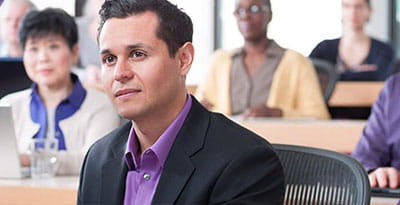
The PHYSICIAN CEO™ Program
Accelerated business immersion program designed exclusively for physicians
The PHYSICIAN CEO™ program is developed by SurgiVision® Consultants, Inc. in collaboration with the Kellogg School of Management at Northwestern University, a top-rated business school for executive education.
This program is unique in its focus on practice growth. Other programs train physicians to be managers, to run hospitals and to comply with regulations and billing procedures. The PHYSICIAN CEO™ program is different. It is explicitly entrepreneurial and focuses on topics relevant to physician leadership, particularly around private practice and entrepreneurial ventures.
The PHYSICIAN CEO™ program provides an intensive, MBA-style experience to train physicians with essential business skills. The program consists of four 5-day “Modules” presented approximately 10 weeks apart. Each module is organized around core topics of interest to physicians across all private practice specialties and a variety of entrepreneurial ventures. Targeted specialties include ophthalmology, plastic surgery, cosmetic dermatology, concierge medical practices, fertility, anti-aging, orthopedics and other specialty areas.
In-person, live discussions are an essential component of business education. While an online course might seem to be more convenient, experience shows that there is no substitute for live teaching—especially given the high caliber professors at Kellogg, and the highly qualified participants in this program.
The PHYSICIAN CEO™ program is designed specifically for physicians from both within and outside the United States. Course structure, cases, assignments, and general focus are directly relevant to running your medical practice. Major emphasis is given to strategy, leadership, negotiations, marketing, operations, finance, corporate structures, and legal topics, among others.
Modules are designed to match the rapid learning pace of physicians, and provide optimal exposure across the key functions of a Lifestyle medical practice.
We hope you will join us for this exciting experience as you transition to become a PHYSICIAN CEO™!
Incentives available for groups and teams of four or more attending open enrollment programs. Learn more


Presented by SurgiVision® Consultants, Inc. in collaboration with the Kellogg School of Management at Northwestern University
Physician CEO
Please email or call us if you would like more information
Who Should Attend
Participation in the PHYSICIAN CEO™ is limited to physicians who are board-certified or board-eligible in a recognized medical and/or surgical specialty. Participants range from those just starting in practice to physicians who have built large practices over a long career. The unifying characteristic is the desire to better understand business principles and cultivate the skills needed to perform as the CEO of your practice.
The PHYSICIAN CEO™ program is specifically designed for physicians who currently or plan to, work in private practice. It is also for those physicians who plan to begin, or are already participating in, an entrepreneurial venture in medicine. PHYSICIAN CEO™ places strong emphasis on strategy, consumer-focus, marketing and operations.
Of note, administrators, assistants, physician-assistants, residents and other personnel are not eligible to participate. Class size is limited.
Key Benefits
Physicians who complete the PHYSICIAN CEO™ program will:
- Be able to oversee their practice, including marketing, finance, operations, personnel, contracts, and other key administrative areas
- Become empowered as leaders, and appreciate the impact that your leadership style has on your practice to ensure that the whole organization is aligned behind your vision of the future
- Recognize your competitive situation and formulate strategies that will allow you to survive and thrive
- Bring an entrepreneurial focus to your practices’ growth
- Negotiate win-win agreements with suppliers and customers
- Lead collaborative teams to solve problems and create new innovations
- Create and manage strategic alliances with other businesses
- Build and leverage your network
- Develop a confident understanding of financial statements and have a framework to evaluate investing, financing and operational decisions
- Analyze your practice to understand the costs and benefits of each service
Program Content
Module 1 - Transitioning to a PHYSICIAN CEO™
Transitioning to be a PHYSICIAN CEO™ provides the framework around what it means to be a CEO. Led by top faculty who are world renown in their fields, this module distinguishes leadership from management and provides concrete examples of how effective leaders convey vision and develop effective teams. Key topics include:
- Insights from successful CEOs on how to lead successful organizations
- An in-depth analysis of who creates value in the medical system, and who captures it
- Entrepreneurship – what it means, when it works, how to create it
- Negotiating essentials
- "Crisis" management
- Identifying and creating alliances
- Managing cognitive biases
- Networks and persuasion
The module combines classroom lectures with extensive discussion, group exercises and a prominent CEO as a guest speaker. Deliverables include the creation of a specific “three dimensions of change” action plan to take back to your practice for immediate implementation. This module sets the stage for those to follow and brings participants well along the journey to implanting change from a CEO perspective.
Module 2 - Positioning Your Practice for Growth
The most successful practices provide specific services to specific populations. This requires a thorough understanding of the market, core competencies and your product offerings. Kellogg’s contributions in the field of marketing are world renown. This module is presented by some of the most insightful and respected faculty at Kellogg, and the concepts are universal. Topics include:
- Consumer insights
- Branding
- Persuasion
- Effective use of data
- Leveraging patient-oriented social media
- The development of sustainable marketing methods
The best marketing is done through patient referrals, a style of marketing often referred to as “internal marketing.” Developing a strong internal The best marketing is done through marketing campaign is not free, not is it easy, but doing so positions a practice for sustainable growth and avoids expensive media spends for advertising. Analysis of strong internal marketing programs will be a major focus of this Module.
During this module, participants will evaluate their own marketing and positioning of their practice and will start the process of refining their approach using the concepts presented. Considerations range from your practice’s presence in the community, the patient funnel, alignments, messaging, presentation, communications, staffing, physical plant, location and services, viewed from the rubric of segmentation, targeting, positioning and delivery. Marketing and positioning are complementary disciplines. This module provides an extensive survey of the critical elements of a successful marketing program, so you can position your practice, or venture, for growth in the expanding field of private-pay medicine.
Module 3 - Building a High Performance Practice
Many medical practices employ business-as-usual approaches to operations. Oftentimes, patient flow is designed to accommodate administrative needs and staffing limitations. The patient experience may be a secondary concern. In some practices, operational flow may even be haphazard without any design at all.
Operations analysts recognize that operational efficiency translates into profits. Why do bottlenecks occur? When does it make sense to add more equipment and personnel? Is it really necessary for patients to wait? Could the office visit be structured more efficiently? Where is the physician spending time, and would it be better spent doing other things?
On another level, many physicians cannot describe which of their services are most profitable, and which may not be worth offering at all. Many physicians confuse higher-price with higher profitability. This is often not the case. Being able to tie every activity in the clinic to costs and contributions to profitability is an essential skill for every PHYSICIAN CEO™.
Medical practices evolve. What might have been optimal last year may no longer work. In a field as dynamic and growing as patient-pay medicine, it is critical to be able to manage change effectively.
This module conveys the CEO approach to optimizing staff, leading highly effective teams, and evaluating practice operations. It will explain how to assign costs to each activity so you can understand where you are making money and where you are not. In- depth discussions about the CEO’s role in change management and optimizing the utilization of staff are presented by highly experienced CEOs using real-world examples.
Specific topics include:
- Aligning operations with practice strategy
- The PHYSICIAN CEO™ as a coach
- Procedure pricing models
- Leading highly effective teams
- Strategic talent management
- Integrating information technology into the patient experience
- Maximizing your operational effectiveness
- The CEO’s role in decisive change management
During this Module, each participant will develop specific understanding about the costs and profitability of their most common services, and develop specific strategies to improve the operations of their practices.
Module 4 - Maximizing the Value of Your Practice
Every PHYSICIAN CEO™ should have a confident understanding of accounting and finance. While it is not necessary to be an accountant or have the skills of a CFO, the CEO should understand the language of finance, be able to interpret financial statements and monitor all the financing and accounting activities in the practice.
This module provides a focused overview of the financial concerns of a medical practice. The major financial statement (income statement, balance sheet, cash flow statement and statement of shareholder’s equity) are examined, with practical approaches about how to interpret them. Participants learn how to evaluate profitability, identify trends, spot vulnerabilities, make financing decisions and decide on investment decisions, all toward the goal of equipping the Physician CEO™ to oversee practice finances.
Module 4 also evaluates the pros and cons of patient financing options, provides an overview of how medical practices are valuated and how practice value can be enhanced, and presents the various business structures for building associations between practices.
Specific topics include:
- Reading financial statements
- Interpreting financial statements
- Evaluating investment decisions
- Evaluating financing decisions
- Approaches to oversee your practice finances
- Patient credit strategies—costs, risks and opportunities
- Valuing a practice and strategies for enhancing practice valuation
- Roll ups, franchises and IPOs
- Legal constraints and opportunities
As the culmination of the PHYSICIAN CEO™ program, Module four devotes a significant portion of time to presentations of the “1, 3 and 5 year Plans for Growth” by the program participants, with group input and feedback.
Faculty
Tom Turmell - Academic Director; Director, Corporate Partnerships, Executive Education, Kellogg School of Management; Managing Director, TMT Capital Partners, LLC.
Eric T. Anderson - Polk Bros. Chair in Retailing; Professor of Marketing
Bernie Banks - Associate Dean for Leadership Development; Clinical Professor of Management
Achal Bassamboo - Charles E. Morrison Professor of Decision Sciences; Professor of Operations; Co-Director of MMM Program
Gail Berger - Clinical Associate Professor of Management & Organizations; Deputy Director, Center for Executive Women; Associate Professor of Instruction, Industrial Engineering and Management Sciences, McCormick School of Engineering
Timothy Calkins - Clinical Professor of Marketing; Associate Chair of the Marketing Department
Rives Collins - Department Chair, Professor, Northwestern School of Communication
Donald Dale - Clinical Associate Professor of Managerial Economics & Decision Sciences
Timothy Feddersen - Wendell Hobbs Professor of Managerial Politics; Professor of Managerial; Economics & Decision Sciences; Chair of Personnel Committee
Gina Fong - Adjunct Lecturer of Marketing; Principal of Fong Insight
Steven Franconeri - Professor of Psychology, Weinberg College of Arts and Sciences; Director, Northwestern Cognitive Science Program; Professor of Leadership, Kellogg School of Management (Courtesy)
Craig Garthwaite - Associate Professor of Strategy; Herman Smith Research Professor in Hospital and Health Services Management; Director of Healthcare at Kellogg
Stephen King - Adjunct Professor of Executive Education
Harry M. Kraemer - Clinical Professor of Management & Organizations; Former Chairman & CEO, Baxter Intl.; Executive Partner, Madison Dearborn Partners
Jim Lecinski - Clinical Associate Professor of Marketing; L.G. Lavengood Outstanding Professor of the Year (2022)
Kate LeVan - Owner and Managing Partner LeVan Partners
Mark McDonald - Vice President and Fellow, Gartner, Inc.
Mitchell A. Petersen - Glen Vasel Professor of Finance; Director of the Heizer Center for Private Equity and Venture Capital
John Philbin - Founder, Spectacular at Work; Founder, Happy Work Spectacular Life
Marian Powers - Adjunct Professor of Executive Education
Sergio Rebelo - MUFG Bank Distinguished Professor of International Finance; Professor of Finance; Faculty Director, EMBA Program
Derek D. Rucker - Sandy & Morton Goldman Professor of Entrepreneurial Studies in Marketing; Professor of Marketing
Robert Schieffer - Adjunct Professor of Executive Education
David Schonthal - Clinical Professor of Strategy; Director of Entrepreneurship Programs at Kellogg; Faculty Director of Zell Fellows Program; Director of the Levy Institute for Entrepreneurial Practice
Leigh Thompson - J. Jay Gerber Professor of Dispute Resolution & Organizations; Professor of Management & Organizations
Brian Uzzi - Richard L. Thomas Professor of Leadership and Organizational Change Co-Director, Northwestern Institute on Complex Systems (NICO)
Jan A. Van Mieghem - Harold L. Stuart Professor of Managerial Economics; Professor of Operations
Robert Wolcott - Adjunct Professor of Executive Education
Edward Zajac - James F. Bere Professor of Management & Organizations
FAQS
Below are the “Most Frequently Asked Questions” about the PHYSICIAN CEO™ Program.
Should you have a question not covered below or if you would like to talk more about the PHYSICIAN CEO™ Program, please contact us:
- Telephone us at 480.664.1800
- Visit our website at PHYSICIAN-CEO.com
- Or send an email to Guy1000@SurgiVision.net
Why do I want to be a CEO? I have a practice administrator who is very competent and manages my office just fine!
CEOs are the Chief Executives, they are not managers! CEOs lead – they provide the vision, define the culture, and determine the brand. Managers carry out the CEOs vision, they execute and work to ensure that the physician’s values guide how the practice is run. The PHYSICIAN CEO™ program is designed to equip physicians with the knowledge and skills needed to be effective CEOs, and to oversee the practice administration. Most physicians do not have the time, nor want, to be the practice managers. But they must be the CEO.
The CEO provides the leadership to ensure that each and every member of their team – from the practice administrator, CFO, bookkeeper, co-management teams and staffers – all understand their vision, their values, and their goals, to effectively execute their jobs accordingly.
I’m so busy and my schedule is swamped. How do I afford the time to attend the PHYSICIAN CEO™ program?
By dividing the program into “Modules” – 4 Modules – that run from Saturday evening through Wednesday afternoon, we accommodate both practice needs and family needs. The Saturday evening start time recognizes how important Friday evening and Saturday morning are for the elective procedure based practices. For families, you won’t miss a Friday night and Saturday morning family event. The Wednesday end point places you back in your practice on Thursday and Friday—Chicago’s O’Hare airport reaches most US and international destinations quickly, making this possible.
The sooner you gain PHYSICIAN CEO™ training, the sooner you will be able to apply CEO skills to your practice. Life-work balance is a key part of the PHYSICIAN CEO™ program. That balance cannot come quickly enough!
Will the PHYSICIAN CEO™ program impact my practice growth?
The PHYSICIAN CEO™ is specifically designed to deliver MBA level content that is of specific relevance to practicing physicians and faculty are hand-selected from Kellogg School of Management at Northwestern University. They fulfill the diverse group of experts required to focus on practice growth. They teach at the accelerated pace physicians are accustom to – packing every session with the content and required, offering a clear pathway toward achieving the goal of the PHYSICIAN CEO™.
Participants examine their current practice at the start of the program and leave the program with a real, executable business plan to grow their practice. Participants are expected to apply practical skills from each module as they go through the program and to immediately execute their business plan after they leave.
Why is the PHYSICIAN CEO™ program different from other business programs advertised as “for physicians” or offered at my industry meetings?
Most business education programs for physicians are designed to train physicians to work as administrators—to run Accountable Care Organizations (ACOs), to work in insurance companies, pharma companies, or as hospital administrators. To our knowledge, the PHYSICIAN CEO™ program is unique in its focus on practice growth. The PHYSICIAN CEO™ program does not train managers rather it empowers physicians to take the role of competent physician CEOs who can grow their practices.
Why should Physicians be CEOs? I didn’t go to medical school to organize office staff.
Leadership is all about communicating the vision and establishing the values. This is the number one core function of a CEO. Medical leadership therefore must come from CEOs who are also physicians. Physicians can be both! Making business people your CEO can sometimes result if driving efficiencies rather than vision and values. The PHYSICIAN CEO™ program does not train managers rather it empowers physicians to take the role of competent physician CEOs who can grow their practices – to instill the right values to drive practice growth, protects patient interests at the same time oversees – not replaces – the business personnel put in place to carry-out your vision and values.
Not all physicians have the ability and maturity to be physician CEOs. Only physicians who understand that they are the engine that drives their practice growth, and that have the potential to do so, should take on the role of PHYSICIAN CEO™.
Why is this taught at the Kellogg School of Management at Northwestern University? Why not offer the program online or at industry meetings like my techs and administrators attend?
Physicians are rare individuals. Physicians have worked extremely hard and sacrificed much; they embody a unique combination of drive, selflessness and ability. The PHYSICIAN CEO™ program recognizes that highly skilled physicians should only receive top-level instruction. This cannot be delivered online or at industry meetings.
Kellogg is the top-rated institution for executive education. The PHYSICIAN CEO™ program is taught by top faculty at a top business school and delivers individual attention to each participant. Kellogg’s Global Hub is a state-of-the-art facility, complete with interactive seminar rooms, fully equipped group meeting rooms, dining facilities, fitness centers, and a prime location on Lake Michigan.
We value your time, we respect your accomplishments, and we treat you accordingly.
What makes Kellogg different from other business schools?
There are many excellent business schools and Kellogg is consistently ranked among the top. The executive education program at Kellogg has consistently enjoyed top ranking.
Speaking generally, and with great respect for other business schools, Kellogg is differentiated in its approach to business from most other schools. For example, some schools teach strategy as a process to gain the most in a competition. Kellogg’s approach to strategy is to find a way to have others work to your advantage, because it is in their advantage to do so. The same “grow the pie” approach is used in negotiations, leadership, operations, and finance. Kellogg is about doing well by fostering success across the board.
This culture is particularly suited for medicine, and especially for practicing physicians who want to grow their practice.
Does the program qualify as an MBA? What happens after graduation?
Participants in the PHYSICIAN CEO™ program receive a Kellogg Certificate as a PHYSICIAN CEO.
This is not an MBA degree program by design. MBA programs are great but they include many topics of limited relevance to physicians. As well, MBA programs teach at a pace that is slower than physicians are used to, and MBA programs take a great deal of time to complete, usually two years and a great deal of time away from home.
The PHYSICIAN CEO™ program delivers content from the Kellogg MBA program that is most relevant to physicians in an accelerated format. Participants are granted Kellogg Executive Education alumni status and can access ongoing business education to pursue additional areas of interest.
What about logistics? Will I be accepted? Are there grades? Exams?
Admission to the PHYSICIAN CEO™ program is offered on a first-come, first-served basis to board-certified or board-eligible physicians who complete the application process. Applicants will be accepted, but space is limited. Applicants who cannot be accepted for the current year will be given priority in the next year’s program.
Experience has shown that PHYSICIAN CEOs hold themselves to a much higher standard than grades or exams could measure and that precious program time is best spent teaching. Therefore, there are no grades in the PHYSICIAN CEO™ program, or exams. Having said that, the program is demanding and what is expected of the participants – we expect that you take your skills back home to grow your practice!
Is there much homework between modules?
Explicit assignments between modules mostly involve two activities: Reading assignments, which are very engaging, and evolving your business plan to grow your practice. The implicit assignment is ongoing – apply what you are learning to grow your practice. All assignments have received positive reviews from the program’s participants.
Some assignments will require some analysis. For these, we expect participants to exercise their CEO skills. If an assignment requires analysis of financial performance, participants have their accountants and practice administrators compile a report for the Physician CEO to interpret.
Homework assignments in the PHYSICIAN CEO™ are minimal. Expectations for thought leadership are unlimited.
Why isn’t the PHYSICIAN CEO™ program taught at medical schools?
To our knowledge, a business education for physicians focusing on practice growth did not exist until this program was created. We believe that business education is an essential component to a medical education, and are working to create a program that will be integrated into the medical school curriculum. The program will be somewhat different than the PHYSICIAN CEO™ program, as new graduates may not be in a position to be CEOs. But much of the content and empowerment that the PHYSICIAN CEO™ program provides will be included.
We are currently forming liaisons with medical schools to launch an intensive, business immersion elective for fourth-year medical students. If you are a medical school faculty member and would like more information, please contact us for information on how to participate.
How and when should I apply to PHYSICIAN CEO™?
Submit your application online in a number of ways:
- Click the "Apply" button above
- Apply using the web address: SURGIVISION.com
- Apply at our website at PHYSICIAN-CEO.com
- Telephone us at 480.664.1800
No application fee is required. You will receive an email confirmation of your submission upon completion. Applicants will be notified of their admission status within 30 days of submitting the application.
Early application is encouraged, as class size is limited to 50 participants per program. Applications are reviewed upon submission and participants are accepted on a rolling basis until capacity is reached.
We look forward to welcoming you to the PHYSICIAN CEO™ program!
Accommodations
Participants in the PHYSICIAN CEO Program will be housed at the James L. Allen Center



